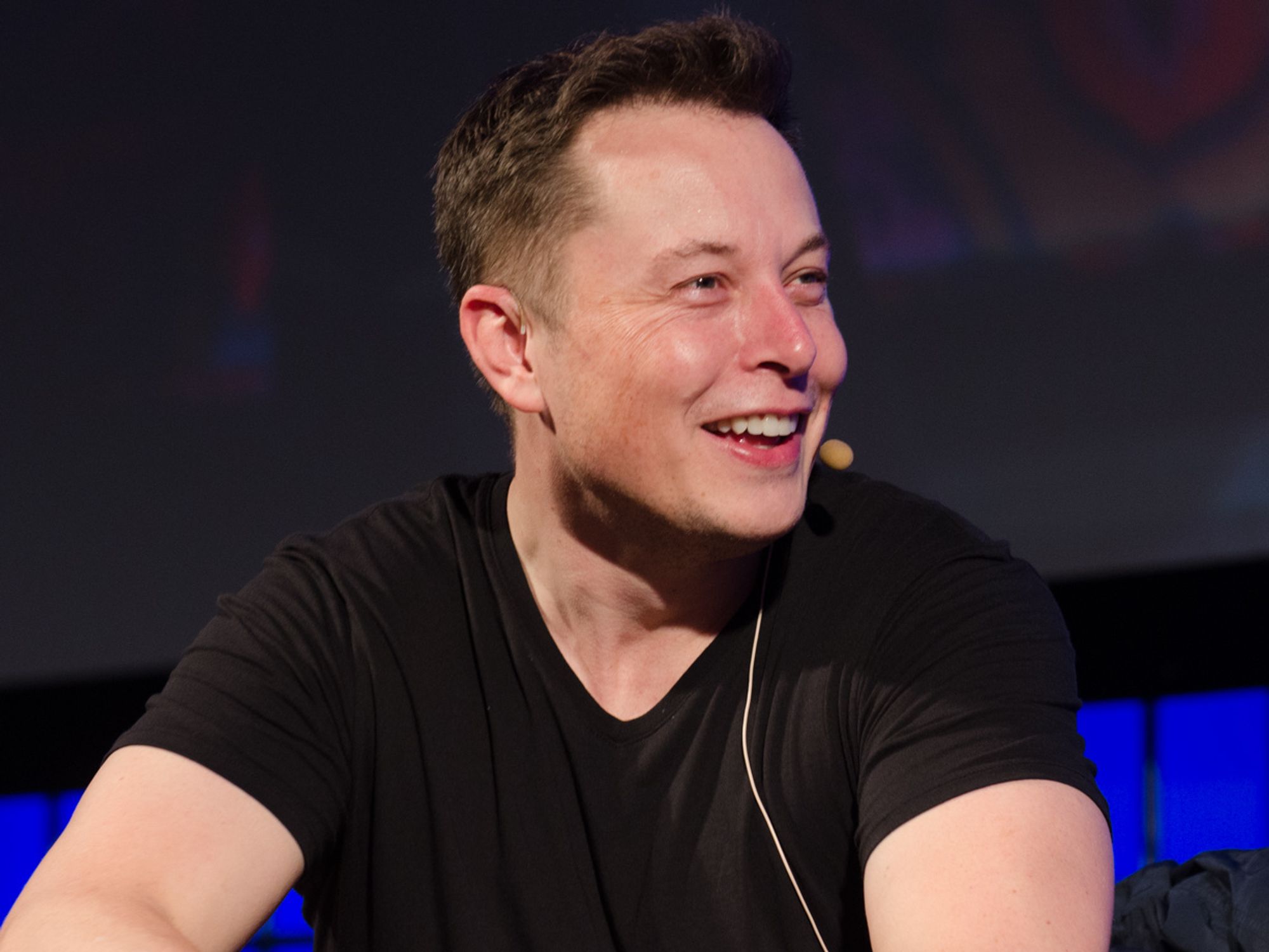SpaceX CEO Elon Musk Says There’s Nothing to Fear From Starlink Broadband Satellites
GeekWire contributing editor Alan Boyle is an award-winning science writer and veteran space reporter. Formerly of NBCNews.com, he is the author of "The Case for Pluto: How a Little Planet Made a Big Difference." Follow him via CosmicLog.com, on Twitter @b0yle, and on Facebook and MeWe.

Will SpaceX's Starlink broadband satellite constellation ruin astronomy? Will it threaten the telecom industry? Will SpaceX spin out Starlink anytime soon?
SpaceX's billionaire CEO, Elon Musk, answered all three questions today at a fireside chat at the Satellite 2020 conference in Washington, D.C.: No, no and no.
The session started late, and Musk seemed a bit tired — perhaps because he'd just come from working on SpaceX's Starship super-rocket development project, which is taking shape at the company's Boca Chica test facility in south Texas. Nevertheless, his fans rushed into the conference hall and hung on his every word.
Starlink and Starship were the prime topics of the talk with conference chairman Jeffrey Hill. Musk didn't unveil any major new initiatives, as he did during past conferences in Mexico and Australia. But he did get a chance to address some of the issues surrounding his multibillion-dollar space projects.
Swarms of Starlink satellites
The Starlink project aims to put thousands of satellites in low Earth orbit, or LEO, to provide broadband internet access to those who are currently underserved (and to the U.S. military as well).
Flat-panel Starlink satellites are being produced at the rate of six per day at SpaceX's factory in Redmond, Wash., and are being launched in batches of 60 from Florida on SpaceX's Falcon 9 rocket. The next batch is due to go up as early as this coming weekend, joining 300 others of the same breed.
Astronomers have voiced rising concerns about having so many satellites flitting through the night sky, but Musk argued that the concerns were overblown. Once the satellites settle into their orbits, they're hard to spot, he said.
"I've not yet met someone who can tell me where all of them are, not even one person." he said. "It can't be that big of a deal."
Nevertheless, he promised that the satellites would be re-engineered if need be to avoid interfering with astronomical observations. "I am confident that we will not cause any impact whatsoever in astronomical discoveries. Zero. That's my prediction," Musk said. "We'll take corrective action if it's above zero."
SpaceX has been engaged in talks with astronomical groups about mitigating potential interference. Musk said such measures could include having the satellites' phased-array antenna manufactured in black instead of white, to cut down on the glare from orbit.
"We're working on a sunshade, because there are certain angles where if the sun gets just right, and there's not just just a little sunshade … then you can get a reflection," he said.
Musk has talked up the idea of beaming internet virtually anywhere around the globe, with signal delay times of less than 20 milliseconds. The aim is to provide enough bandwidth to stream high-definition movies or play quick-response video games. But Musk acknowledged that there were some areas of the world where Starlink might not be able to offer a competitive service.
"The challenge for anything that is space-based is that the size of the cell is gigantic," he explained. "It's great for very low to maybe medium-sparsity situations, but it's not good for high-density situations. We'll have some small number of customers in L.A., but we can't do a lot of customers in L.A., because the bandwidth per cell is to be not high enough."
For high-density areas, Musk said terrestrial 5G service might make more sense. The plan is for SpaceX's Starlink to mesh with terrestrial telecom services to fill in the coverage gaps.
"It's not some huge threat to telcos," Musk said. "I want to be super-clear: It is not. In fact, it will be helpful to telcos, because Starlink will serve the hardest-to-serve customers that telcos otherwise have trouble dealing with."
Musk has said the billions of dollars in revenue from Starlink would go toward developing the Starship launch system for trips to Mars. More recently, SpaceX's president and chief operating officer, Gwynne Shotwell, floated the idea of spinning out Starlink as a publicly traded company. Today Musk played down that idea.
"We're thinking about that zero," he said. "We need to make the thing work. … It's real important to just set the stage here for LEO communications constellations. Guess how many LEO constellations didn't go bankrupt? Zero."
Musk said he wanted to make sure that Starlink didn't follow in the footsteps of Teledesic (the telecom venture backed by Bill Gates that fizzled out two decades ago) or Iridium (which went bankrupt but was restructured). "That would be a big step, to have more than zero in the not-bankrupt category," he said.
Speeding ahead with Starship
Going not-bankrupt is also a motivator in the Starship development effort, which is focusing on developing and testing prototype rocket components in quick succession. One stainless-steel Starship prototype, known as SN1, burst apart at Boca Chica less than two weeks ago. SpaceX is already moving on to SN2.
Cost concerns were among the reasons why Starship prototypes are being built so quickly, and being built out of steel rather than, say, carbon composite.
"It may sound like some great insight, but it actually happened because we were moving too slowly on composite," Musk said. "I was like, we cannot move this slowly or we'll go bankrupt. So do this with steel."
Starship is being designed for a turnaround time of as little as an hour between landing at the end of one mission and launching to start the next mission. "We want to aim toward a capability of three flights a day for the ship," he said.
Musk is targeting this year for the start of limited Starlink service, and for the first orbital launch of a Starship spacecraft. Those aspirational goals aren't motivated merely by a fear or going bankrupt, but also by a fear of not going where Musk wants to go.
"If we don't improve our pace of progress, I'm definitely going to be dead before we go to Mars," the 48-year-old billionaire said. "I would like to not be dead by the time we go to Mars. That's my aspiration here."
On other topics:
- Musk said he was glad that SpaceX's Crew Dragon space capsule will play a role in transporting astronauts to and from low Earth orbit, but he also sounded wary about focusing too much on LEO operations. "I think we need to be very careful of getting stuck in a local maximum," he said, using a mathematical term. "The space shuttle was something that was really stuck in a local maximum for a long time, and we don't want to be in that situation."
- Musk said reusable rockets and in-space refueling will be essential for getting to Mars, but he didn't think going to the moon or making use of lunar resources was all that necessary. "The moon is neither here nor there," he said. "Using the moon would be like, OK, if you want to cross the Atlantic, maybe you want to go to Iceland, probably not. To visit, sure, but it's not a mandatory step."
- In response to a student's observations about how hard it was to get the education required for jobs in the satellite industry, Musk provided an unconventional perspective. "You don't need college to learn stuff," said Musk, who dropped out of Stanford to launch a startup. "You can learn anything you want for free. … There is a value that colleges have, which is seeing whether somebody can work hard at something, including a bunch of annoying homework assignments … and get it done."
- There's a Seven-Story Tall Statue of Elon Musk in Tulsa (Really) - dot.LA ›
- SpaceX Under DOJ Scrutiny For Alleged Hiring Discrimination - dot.LA ›
- When Will SpaceX's Starlink Internet Service Land in L.A.? - dot.LA ›
- ABL Space Systems Sends Amazon Satellites Into Space ›
- SpaceX's Starbase Static Fire Destroys Protected Wilderness - dot.LA ›
- Why Relativity Space and SpaceX Rockets Keep Getting Bigger - dot.LA ›
GeekWire contributing editor Alan Boyle is an award-winning science writer and veteran space reporter. Formerly of NBCNews.com, he is the author of "The Case for Pluto: How a Little Planet Made a Big Difference." Follow him via CosmicLog.com, on Twitter @b0yle, and on Facebook and MeWe.



 Image Source: Perelel
Image Source: Perelel
 Image Source: Valar Atomics
Image Source: Valar Atomics Image Source: Waymo
Image Source: Waymo Image Source: Apple
Image Source: Apple